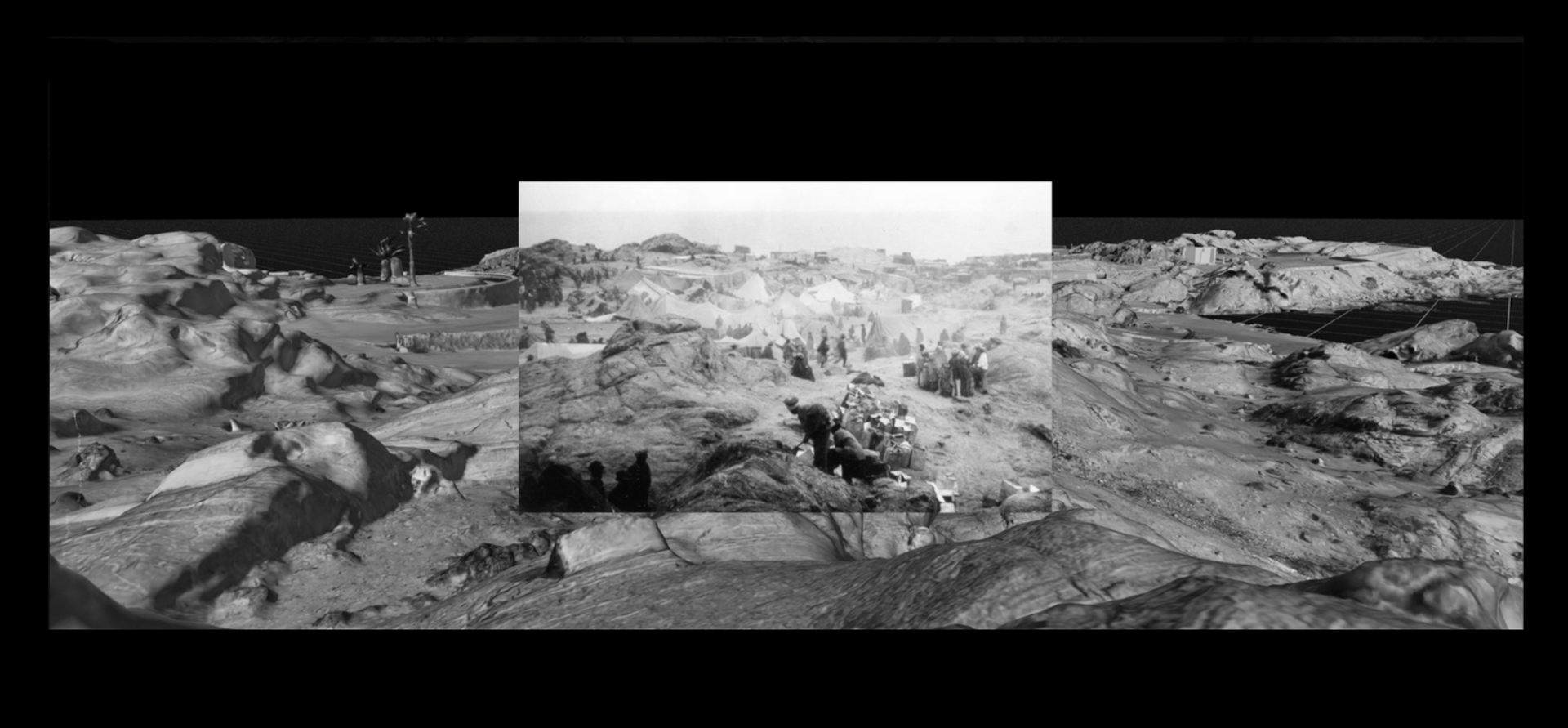Referentinnen und Referenten
Speakers of the event series
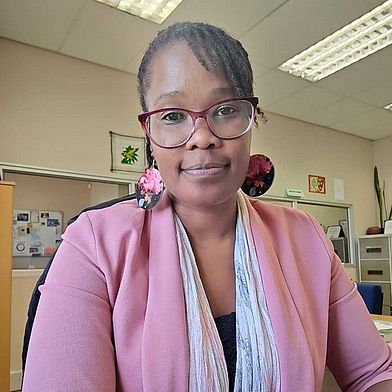
Marcella Katjijova ist eine Nachfahrin der Überlebenden des Genozids an den OvaHerero und Aktivistin und psychologische Beraterin für die OvaHerero Genocide Foundation (OGF). Sie leitet die Abteilung für intergenerationale Traumata und Heilung, wo sie zu Transformation, Heilung und intergenerationaler Weitergabe kolonialer Traumata arbeitet. Die durch koloniale Gewalt verursachten Verletzungen zeigen sich spürbar in den Familien und Communitys der OvaHerero, die den ersten deutschen Genozid des zwanzigsten Jahrhunderts überlebten. Marcella fordert daher klar: Der Kampf für Reparatur beinhaltet auch Rehabilitation, die Wiederherstellung der psychosozialen (Ver-)Bindungen, der Integrität und Würde der Einzelnen und der Community als Ganzes durch Lobbyarbeit, psychologische Bildungsprogramme und Kapazitätsentwicklung, um nur einige zu nennen.
Marcella Katjijova is a licensed Psychological Counsellor and activist for the OvaHerero Genocide Foundation (OGF) and a descendant of the OvaHereo survivors of the German genocide. She heads the intergenerational Trauma and Healing Division where she works on the transformation, healing and intergenerational continuation of colonial trauma. The wounds caused by colonial violence are tangibly articulated in the families and communities of the OvaHerero survivors of the first German genocide in the 20th century. Marcella therefore clearly demands that the struggle for reparation must also include rehabilitation, the restoration of psychosocial ties, the integrity and dignity of the individual and the community at large through advocacy, capacity building and psycho education programs to mention a few.
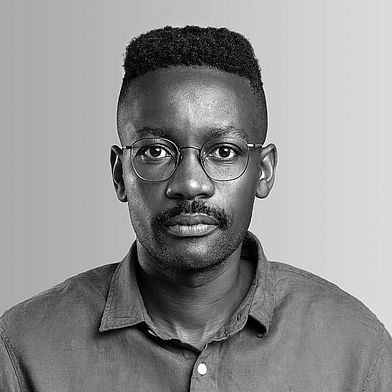
Mark Mushiva ist informationstechnologischer Spezialist beim Forschungskollektiv Forensis/Forensic Architecture. Der promovierte Creative-Decolonial Technologist wuchs in Namibia auf. Seit Jahren transzendieren seine Forschungsarbeiten kontinentale Grenzen. Zwischen Berlin und Windhoek entwickelte er die filmischen Rekonstruktionen der deutschen kolonialen Verbrechen im heutigen Namibia maßgeblich mit. Die anhaltende Geschichte mit höchsten Forschungsstandards gemeinsam mit den betroffenen Communities beredet zu machen, ist ihm auch ein politisches Anliegen.
Mark Mushiva is an information technology specialist at the research collective Forensis/Forensic Architecture whose research work has transcended continental borders for years. Between Berlin and Windhoek, the graduated creative-decolonial technologist with Namibian citizenship played a key role in developing the film reconstructions of German colonial crimes in present-day Namibia. As an activist he used the highest standards of research creatively to discuss the ongoing history and the fight for transgenerational justice together with the affected communities.
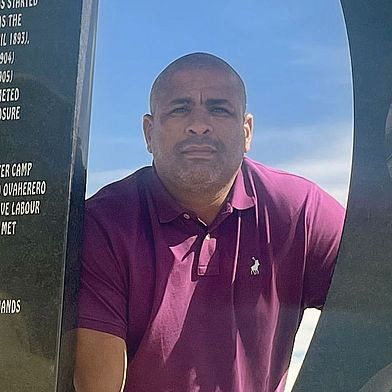
Maboss Ortmann kämpft als Sprecher des Technischen Komitees der Nama Traditional Leaders Association (NTLA) unermüdlich für die Anerkennung des deutschen Genozids an den Nama und Ovaherero, für Wiedergutmachung – und dafür, dass die Stimmen der betroffenen Communities hörbar werden. Die filmischen Rekonstruktionen begleitete er vor Ort und zeigte die fertigen Dokumentationen In Kooperation mit medico in Städten und ruralen Gebieten in Namibia, um dort die eigene Geschichte und deren anhaltenden psychosozialen Folgen, die in der offiziellen namibischen Geschichtsschreibung kaum einen Platz bekommen, besprechbar zu machen.
As spokesperson for the Technical Committee of the Nama Traditional Leaders Association (NTLA), Maboss Ortmann fights tirelessly for the German genocide against the Nama and Ovaherero to be recognised, for reparations to be made - and for the voices of the affected communities to be heard. He accompanied the film reconstructions on site. In cooperation with medico, he showed the documentaries in cities and rural areas in Namibia in order to create space to discuss the country's own history and its lasting psychosocial consequences, which are hardly given any space in official Namibian historiography.
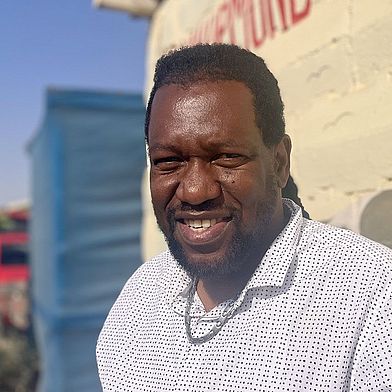
Laidlaw Peringanda ist Nachfahre der Überlebenden deutscher Kolonialverbrechen, Aktivist und Gründer des Swakopmund Genocide Museums. Auch er ringt um die Anerkennung des Genozids, um Wiedergutmachung und Würde. Sein unermüdlicher Kampf beinhaltet nicht nur das Aufrechterhalten von Gedenken und der Pflege des kolonialen Massengrabs in Swakopmund, die Entwicklung von Bildungs- und Austauschprogrammen zwischen Namibia und Deutschland, sondern auch das Ringen mit den Nachfahren weißer Sieder im heutigen Namibia, die ihn bereits mit dem Tod bedrohten.
Laidlaw Peringanda is a descendant of survivors of German colonial crimes, an activist and founder of the Swakopmund Genocide Museum. He is fighting for the genocide to be recognised, for reparations and dignity. His tireless struggle includes not only maintaining the memorial, taking care of the colonial mass grave in Swakopmund, the development of educational and exchange programs between Namibia and Germany, but also the struggle with the descendants of white settlers in today's Namibia, who have already threatened him with death. But are not able to stop his fight for justice.

